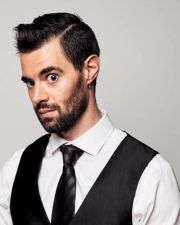Composition
Bachelor of Music
Most programs in the UCF School of Performing Arts require an audition or interview.
UCF student composers come from many backgrounds, and this is evident in the exciting and diverse music they create. Whether writing for the concert hall or for film, television or video games, our students pride themselves on their dedication to craft, openness to new ideas and meaningful interaction with listeners.
Composition students will take theoretical and practical courses in music composition as well music history, theory, film and video game composition, piano, conducting and more. They perform in major and minor ensembles, and hear their own compositions played at composition studio recitals.
The composition studio at UCF is small and competitive. Student composers receive an extraordinary amount of personalized instruction and are able to access resources set aside exclusively for their use, including UCF’s state-of-the-art Media Composition Lab.
What opportunities do UCF composition students have?
Student composers are encouraged to explore a wide variety of styles and aesthetics. In addition to on-campus recitals, student composers’ works are performed by the UCF New Music Ensemble at the Dr. Phillips Center for the Performing Arts during UCF Celebrates the Arts each year.
UCF is also home to the National Young Composers Challenge, a nationwide competition for pre-collegiate composers. UCF composers are given the opportunity to mentor and interact with these gifted younger students when they visit Orlando each spring.
Students participate in a weekly masterclass, featuring presentations by and conversations with guest artists. Some previous guests have included Angélica Negrón, Gabriel Kahane, Nicholas Omiccioli, Scott Lee, Jenny Lin, Anna Clyne, loadbang and many others.
What sets composition at UCF apart from other programs?
While the composition program is small and intimate like many of the top conservatory programs, it is supported by the financial and technological resources of a large research institution. Student composers have access to cutting edge creative tools and can receive financial support through student grants and awards.
UCF is dedicated to equipping composition students to succeed in all the various professional avenues available to them. Whether they choose to pursue a graduate degree, compose for film, compose for video games or compose for the concert hall, there is coursework in the UCF curriculum that will support their goals.
What are UCF composition graduates doing now?
Graduates from the program often go on to graduate school, work as freelance composers and teach.
Application Requirements
The audition process for prospective composition students consists of three parts:
1. Portfolio
Due no later than January 15 each year.
APPLY NOW WITH ACCEPTD
- Three (3) completed compositions for different instrumentations or media, chosen to demonstrate the depth and breadth of their ability.
- Audio recordings for the submitted works (live recordings are preferred, but electronic realizations are acceptable).
Composition portfolios are submitted using AcceptD. All candidates (graduate and undergraduate) must complete their UCF applications before submitting their portfolios.
Scores should be neatly and legibly notated or engraved, and clearly labeled with your name and the year of composition. If one or more of your portfolio compositions does not have a written score (for example, electronic compositions or improvisations), submit a one-page written document describing the piece in place of a score.
2. Theory Exam
Must be completed no later than January 31 each year.
In late January, applicants will receive a link to an online theory exam. The exam is timed and takes approximately 30 minutes to complete. The purpose of this exam is to assess applicants' existing theory knowledge. Doing poorly on the theory exam does not disqualify applicants from entering the composition studio–applicants' scores are used to determine the curriculum the applicant follows once admitted.
The theory exam addresses the following fundamental topics in music theory:
- Interval identification
- Scale identification (major, minor)
- Key signature identification (major, minor)
- Diatonic modes (ionian, doiran, phygian, lydian, mixolydian, aeolian, locrian)
- Triad identification (major, minor, augmented, diminished)
- Basic rhythm and meter groupings
- Basic orchestration (instrumental ranges and capabilities)
- Tempo and technique indications
The theory exam can only be taken once. If you experience a problem while taking the exam, please email alexander.burtzos@ucf.edu with the subject line [YOUR LAST NAME]_THEORY_EXAM. Applicants will not see their score after completing the exam, but will receive confirmation that their results have been successfully recorded.
3. Interview
Takes place during February each year.
Some applicants will be contacted via email in late January or early February for an interview with UCF composition faculty. This interview may take place in person during one of UCF's February audition dates, or remotely via web conference or telephone call. The interview is approximately 20 minutes in duration. Its primary purpose is to give the applicant an opportunity to talk more about their artistic and professional goals, and to ask questions of the faculty as needed. Scholarship decisions will also be based partially on the interview. Parents/guardians of undergraduate applicants may participate in the interview if they wish.
Admissions and scholarship decisions will be made no later than March 15 of each year. Admitted students have until May 1 to enroll, after which studio spots may be offered to candidates on the wait list.
“FREE/VERSE” (2022)
Music by UCF Composition Students
Performed by the UCF New Music Ensemble
Steinmetz Hall, Orlando, FL

